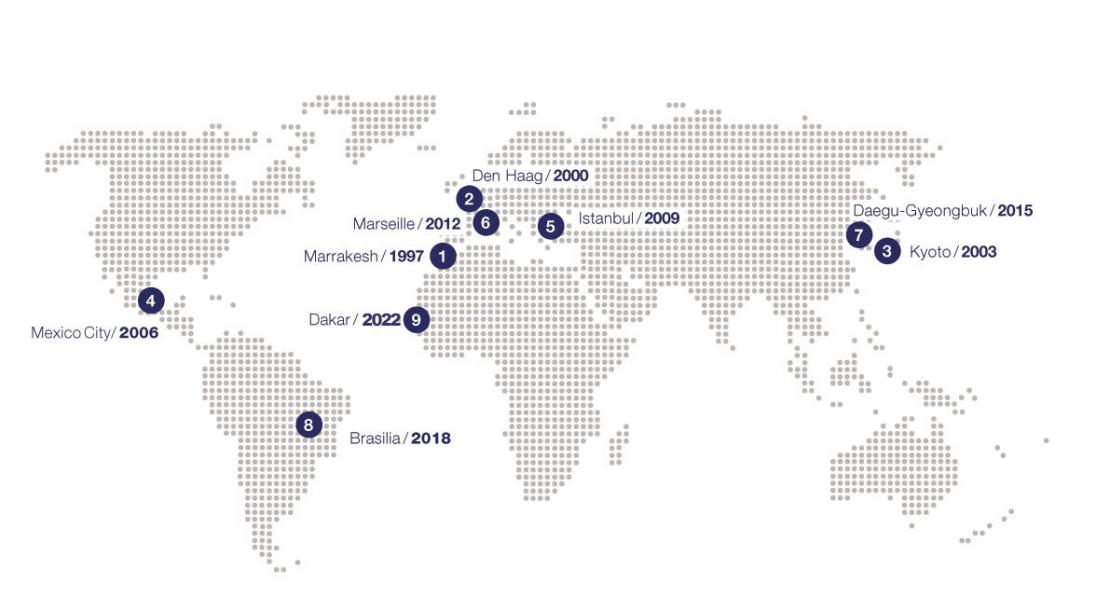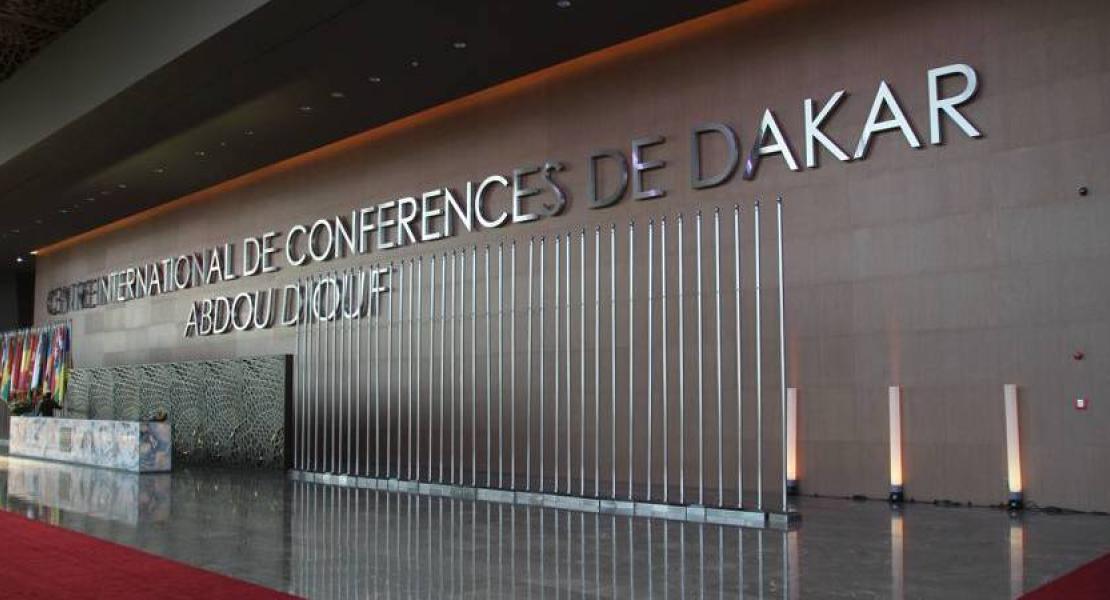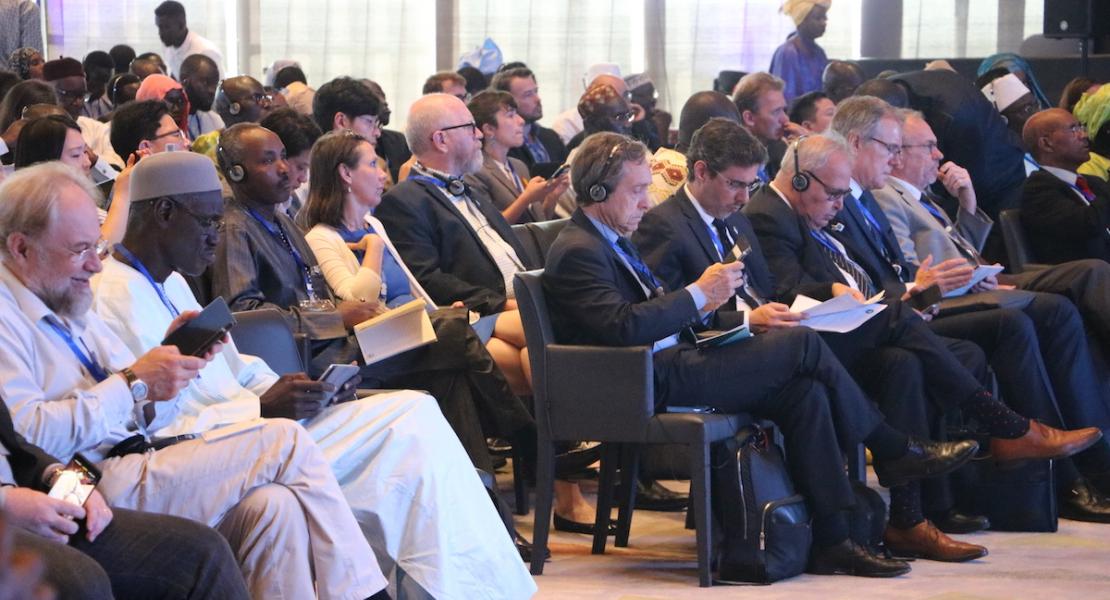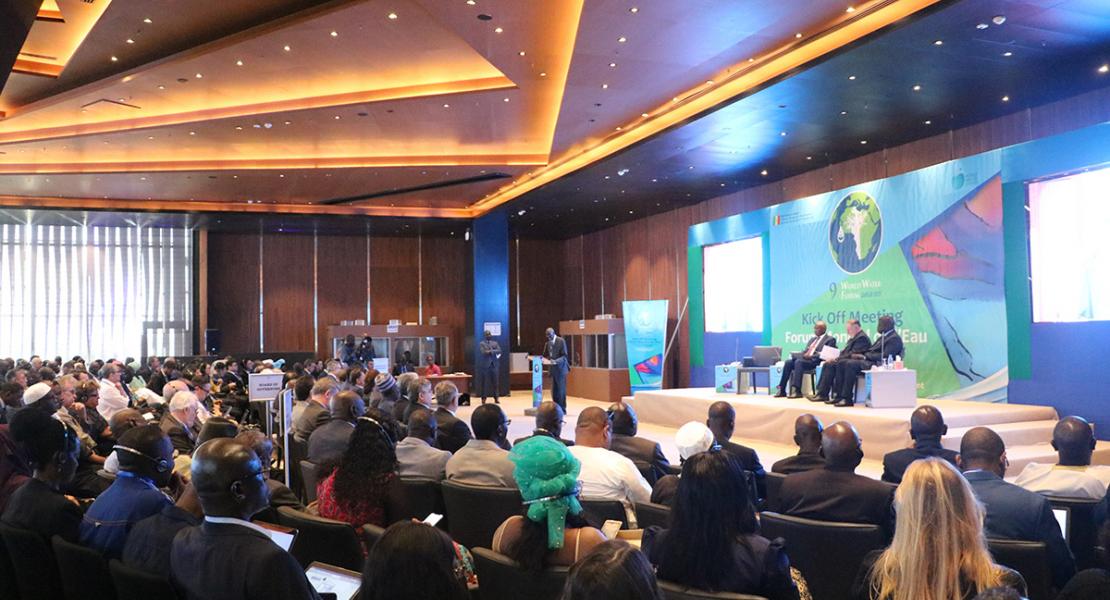The World Water Forum is the main international event on water issues, organized every three years since 1997 by the World Water Council, in partnership with the host country. It is part of the process of global collaboration on water issues, providing the only international space for debate and expert input for policy and decision-makers on water issues.
- The First World Water Forum was held in Marrakech, Morocco in March 1997.
- The Second World Water Forum was held in The Hague, the Netherlands in March 2000. It brought together 5,700 participants, including 114 ministers and representatives from 130 countries and 500 journalists.
- The Third World Water Forum was held in three Japanese cities: Kyōto, Ōsaka and Shiga, from 16 to 23 March 2003.
- The Fourth World Water Forum was held in Mexico City, Mexico, from 14 to 22 March 2006. It brought together 12,000 participants, including more than 120 ministers responsible for water, around the theme "Local actions to meet a global challenge".
- The Fifth World Water Forum was held in Istanbul, Turkey, from 16 to 22 March 2009. Its topic was "Bridging divides for Water".
- The Sixth World Water Forum was held in Marseille, France, from 12 to 17 March 20122,3. The theme of this year's Forum is "Time for Solutions "4,5.
- The Seventh World Water Forum was held in Daegu, South Korea, from 12 to 17 April 2015. The theme is "Water for our Future".
- The Eighth World Water Forum was held in Brasilia, Brazil, 18-23 March 2018. The theme is "Sharing".
- The Ninth World Water Forum will be held in Dakar, Senegal, from 21 to 26 March 2022.
The commitments / decisions / main findings of past Forums
MARRAKECH 1997
The 1st World Water Forum, organised in Marrakech, Morocco in 1997, served to outline the huge dimension of the world water crisis. The Marrakech Declaration gave the WWC a mandate to develop a “World Water Vision” (Long Term Vision for Water, Life and Environment in the 21st Century), as a first step towards solving this crisis. After extensive work the “Vision” was published in 2000 and presented at the 2nd World Water Forum.
THE HAGUE 2000
In 2000, the 2nd World Water Forum in The Hague, Netherlands, generated a significant debate on the Water Vision for the Future and its associated Framework for Action. It proposed the establishment of a monitoring team to survey the efforts of the global water community in converting the Vision into actions and to report to the 3rd Forum on ongoing progress. As a result, the “World Water Actions” report, an inventory and analysis of 3000 actions on the ground, was published in 2003. It demonstrated the considerable efforts of people all around the world to address many critical water issues. For the first time a Ministerial meeting was held that yielded the identification of the most important problems to be dealt with.
KYOTO 2003
In March 2003, the 3rd World Water Forum in Kyoto, Shiga and Osaka, Japan, clearly stated its resolution to involve all stakeholders through, for example, the creation of a “Virtual Water Forum” and the gathering of thousands of testimonies through the “Water Voices” As a follow-up to the 2nd Forum, the Council presented its “World Water Actions” Report. By gathering more than 24,000 participants, the 3rd World Water Forum was the largest water-related event ever organised. One hundred and thirty ministers attended the Ministerial Conference. An ad-hoc Portfolio of Water Actions including several hundred local or regional commitments were made and published later on a dedicated web site. Each Forum session organiser developed a list of concrete actions to be implemented in the near future.
MEXICO 2006
During the 4th World Water Forum in 2006 in Mexico City, close to 20,000 people from throughout the world participated in 206 working sessions, where a total of 1600 local actions were presented. Participants included official representatives and delegates from 140 countries including 120 mayors and 150 legislators, and 78 Ministers. Nearly 1400 journalists were present. Noteworthy outcomes included:
- The establishment of the Asia-Pacific Water Forum;
- The launch of the Water Integrity Network;
- The publication of:
- The Right to Water - From Concept to Implementation;
- Task Force on Financing Water for All - Report 1. Enhancing Access to Finance for Local Governments - Financing Water for Agriculture;
- Costing MDG Target 10 on Water Supply and Sanitation: Comparative Analysis, Obstacles and Recommendations;
- Official Development Assistance for Water from 1990 to 2004 - Figures and trends.
ISTANBUL 2009
Over 30,000 participants from 182 countries took part in the 5th World Water Forum, from 16 to 22 March 2009 in Istanbul, Turkey. More than 400 organizations prepared together over 100 sessions organized according to 6 themes, 7 regional reports and 5 high-level panels. For the first time in the World Water Forum’s history, a Heads of State meeting was organized. In addition, the Ministerial Statement and Water Guide were developed through a series of four preparatory meetings of government officials, in which Thematic and Regional Coordinators and representatives of Major Groups participated. Further exchanges with stakeholder representatives were organized through ministerial roundtable discussions during the 5th World Water Forum. Local and Regional Authorities in attendance produced the Istanbul Water Consensus (IWC), a new compact for Local and Regional Authorities willing to commit to adapting their water infrastructure and services to the emerging challenges they are facing. It was also the first time that over 250 Parliamentarians from around the world jointly started to address water issues.
MARSEILLE 2012
During one week in Marseille, France from 12 to 17 March 2012, the 6th World Water Forum brought together stakeholders from all over the world for the Time for Solutions. Participants representing over 173 countries attended this international triennial event, for which nearly 35,000 entries were recorded, including 15 Heads of State or Government and 112 Ministers, Vice-Ministers and Secretaries of State. Over 250 sessions took place in the presence of some of the world’s most influential decision makers for water. The 6th World Water Forum also offered the Village of Solutions and the Platform of Solutions, gathering existing solutions for water and sanitation challenges that can be scaled up and replicated elsewhere. A new process was initiated to highlight grassroots and citizenship actions. Finally, an unexpected surplus in revenue was committed to supporting a limited number of projects on the ground following the 6th World Water Forum.
DAEGU-GYEONGBUK 2015
The 7th World Water Forum took place at a turning point at the dawn of a new set of global goals for sustainable development. It marked the rise of a new paradigm in catalyzing positive change for a water-secure world. It set a new record for attendance of the ministerial process. It facilitated a number of political agreements which marked a step forward in international water cooperation, like the one signed between Japan, Korea and China. In addition, a consortium of 19 international water-related organizations became Champions for the Daegu & Gyeongbuk Implementation Commitment (DGIC), which sought to assemble the major goals for action within each of the Forum’s 16 thematic areas with the intention of supporting and monitoring progress in those areas over the following three years. These mechanisms served to guide collective action and keep track of progress in a public arena. At the 8th Forum, 61% of the key focus areas were completed and 36% were more than half completed.
BRASILIA 2018
Held in the city of Brasilia, Brazil from 18 to 23 March 2018, the 8th World Water Forum marked the largest edition in history of the event, organized for the first time in the southern hemisphere. In particular, the Citizen’s Village was visited by over 100,000 people, including over 57,000 youth and children. In addition, for the first time, 83 Judges and Prosecutors participated in discussions related to water and the judicial process, including debates on the rights of rivers as legal entities or climate change crises. A Sustainability process and declaration were created for the 8th World Water Forum, in addition to a dedicated Business Day. Finally, it was estimated that 2,500 direct jobs and 5,500 indirect jobs were created by the Forum.








